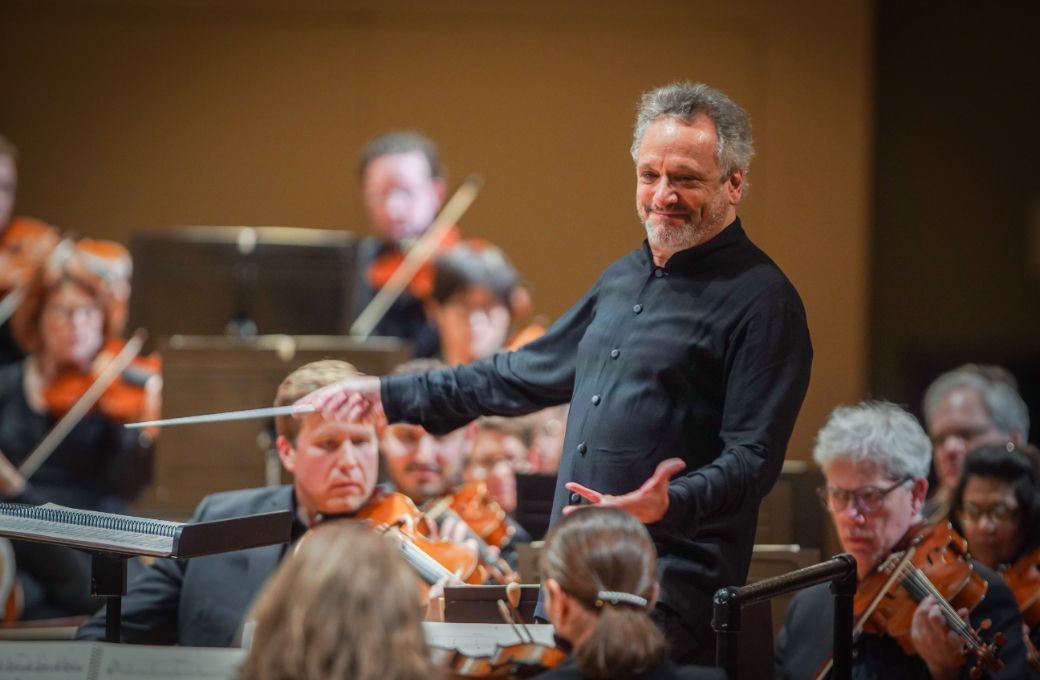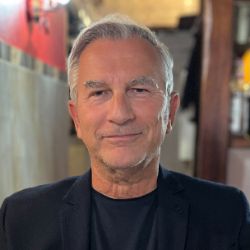It’s breakfast time and Louis Langrée is heading for Cincinnati airport. The previous evening, the Cincinnati Symphony Orchestra’s French music director has conducted the first concert of his eleventh and last season. Last summer, he closed another crucial chapter of his career, 20 years at the head of the Mostly Mozart Festival in New York, which was unceremoniously discontinued this year. While his Cincinnati episode is also coming to a close, the conductor is celebrating two years in charge of the Opéra-Comique in Paris: we are speaking to a genuinely transatlantic musician.
Jean-Pierre Rousseau: You’re the defining example of a French conductor who has spent the bulk of their career abroad. How did that come about?
Louis Langrée: It’s not only in France that this happens. Look here, in the US – all the great orchestras are headed up by foreigners (as, indeed, they have been in the past): Andris Nelsons in Boston, Riccardo Muti in Chicago, Jaap van Zweden in New York, Gustavo Dudamel in Los Angeles… In Berlin, you have Krill Petrenko, in Munich you have Simon Rattle, while in Paris, you have two Finns and a Romanian! Of the fourteen music directors who have headed the Cincinnati Symphony, only three have been American. This is one of the oldest orchestras in the country and it’s been enriched the presence of such contrasting personalities as Eugène Ysaÿe, Fritz Reiner, Max Rudolf or, more recently, Thomas Schippers, Michael Gielen or Paavo Järvi, my immediate predecessor.
In fact, orchestras take us on to benefit not just from the experience we have built up, but also to get a fresh vision of the repertoire, which will renew their colour palette and the way they approach works. Conversely, the musicians bring to the conductor their own tradition and experience. There’s no such thing as the perfect conductor falling from heaven: the mandate is successful when the relationship between music director and orchestra is a fertile one. I believe that I have brought a great deal to the orchestra here and I am certain that the Cincinnati musicians have made me a better conductor.
This is your last season in Cincinnati, after eleven years of conducting. Why stop now?
I’ve put a lot of effort into my role as music director here. Unlike in Europe, the music director is the face and embodiment of the orchestra, particularly in relation to its audience and the patrons who are the orchestras’ financial backbone. I also put a lot of effort into all the community initiatives that the orchestra undertakes with the city and its audiences. But after a decade, the musicians and I know each other so well that I know they can guess almost exactly what I’m going to say to them in rehearsal, and I know myself how a particular passage will sound before I’ve even rehearsed it!
I don’t want to open the possibility of our relationship lapsing into mere routine. I preferred to leave three years too soon rather than stay five minutes too long. And of course, since 1st November 2021, I have had the honour and the pleasure of directing the Opéra-Comique in Paris, one of France’s most wonderful institutions.

Before Cincinnati, you were in New York, directing Lincoln Center’s Mostly Mozart Festival since 2003. Last July was your last concert, before the closing down of a festival whose reputation you did a great deal to enhance, and that was New York’s only summer festival dedicated to classical music. What happened?
For a start, when there is success – in New York, in Cincinnati or anywhere else – it’s never the success of a single person. It’s the result of teamwork, of a close relationship with those in charge of the organisation, the administration and all its partners. In New York, I had the good fortune to have an exceptional partner in the shape of Jane Moss, who was the artistic director of Lincoln Center until 2019.
With Jane’s departure, the change of president of Lincoln Center and the increasingly tangible evidence of what is called “cancel culture” in Europe, the new team in charge decided that the name Mozart itself was too elitist. They decided to get rid of all their different festivals and will now be presenting its “Summer for the City” festival. In point of fact, the Mostly Mozart Festival was founded in 1966 by the composer William Schuman and its audience was the one that grew up with and was shaped by Leonard Bernstein and his Young People’s Concerts. Both in New York and across the world via television, these extraordinary educational sessions with the New York Philharmonic, imbued hundreds of millions of children from all sorts of social backgrounds with a musical language.
What is essential, and what the Maîtrise Populaire de l’Opéra-Comique has done so well here in France, is to always combine social diversity with artistic excellence, and never to set them against each other, as sometimes seems to be the case. Because the real problem in the United States today is the failure of its education system. All too often, public school education has nothing in common with private school education. How is it possible that the United States, the richest country in the world, has allowed poverty to spread, to blight entire neighbourhoods and towns, and has abandoned its essential educational mission?
In Cincinnati, I have conducted orchestras of young, middle and high school students, and I have taken part in the educational and social programmes of several associations, often with spectacular results. In 2016, the CSO set up a Diversity Fellowship with the Cincinnati Conservatory. It was the first American orchestra to appoint a Chief of Diversity and Inclusion Officer to its management team, and it has also joined forces with the Nina Simone Piano Competition to promote young black American pianists.
Is it fair to say that classical music audiences are disappearing?
No, I don’t think so. Firstly, because we have never needed music so much. Because music brings together a society and cements it, especially in hard times. And I don’t believe either that this audience can be renewed and enlarged while denying our culture, our reference points, by excusing ourselves from playing so-called classical music.
When people discuss opera staging, there’s a polemic that recurs: the primacy of the director. As someone who has conducted a large number of productions in the greatest theatres and festivals, what is your view on this subject?
It’s a false dichotomy, because everything comes down to personality. When Patrice Chéreau staged an opera, he was “le chef”. When Riccardo Muti conducts one, he’s “the boss”! I’ve had the good fortune to work with some very different personalities: Dmitri Tcherniakov, Peter Sellars, Deborah Warner, Moshe Leiser, Patrice Caurier and so many others, in Aix-en-Provence, Glyndebourne, Paris, Vienna, New York or Milan. We have always, I believe, sought to work together to serve the composer’s intentions.
Even the most unexpected ideas can increase our understanding of a work. I remember Pelléas staged by Pierre Strosser. At the end of Act 4, during Pelléas’ death scene, when he confides to Mélisande, “I had no idea you were so beautiful...”, his gaze lost in the distance, the two singers were at opposite ends of the theatre with the full width of the stage between them. It was incredibly beautiful and profound, far more so than if they had sung that phrase directly in front of each other.
It’s now been two years since you took over as General Director of the Opéra-Comique, to the surprise of the press and the music world. With the international career that you have as an opera and orchestral conductor, why did you apply for such a demanding position?
After almost forty years working in opera houses, I decided to take on this new challenge. I had previously only held the position of musical director and I wanted to take on the full responsibilities of an institution as emblematic as the Opéra-Comique, an essential theatre in French musical history. Just think that it’s the place where Carmen, Pelléas, Manon, La Damnation de Faust, Les Contes d’Hoffmann, L’Heure espagnole, La Voix humaine, Roméo et Juliette and so many other masterpieces all had their first performances!
I may not have anticipated quite the extent of the constraints that make up the ordinary life of a general director, in addition to programming and taking care of teams and shows. Increasingly tight budgets, the search for co-producers and patrons to find a new economic model, relations with our supervisory bodies, the consequences of the pandemic and international tension have had a severe impact on all opera houses – and many of them have had to cut back. Add to that the fact that I took up my post immediately after the appointment was announced, right in the middle of Covid-19, plus the need to provide immediate operational responses to situations that were unprecedented for us. For example, in order to be able to maintain the premiere of Gounod’s Roméo et Juliette in December 2021, we had to replace the two title roles and several musicians at the last minute, with a reduction in the number of dancers and chorus members.
But the teams are of such a high standard, so responsive and so committed to the house that I have never regretted my choice. My enthusiasm is undimmed, because I believe, more than ever, that a national institution like the Opéra-Comique must be a home for everyone, not just lip service but in reality. The Maîtrise Populaire de l’Opéra-Comique is an example of successful integration, social diversity and artistic excellence, and is constantly developing ambitious projects. Our new academy helps young artists and plays a part in launching their careers by including them in our programming. We regularly commission and create new scores, adding to our catalogue of over 3,000 works!
And we are the cheapest lyric theatre in Paris, with ticket prices starting at six euros. We are also the most accessible theatre, welcoming all audiences, including those with severe disabilities at our “Relax” sessions. A national theatre is an institution that belongs to all of us.
Jean-Pierre was speaking to Louis Langrée in Cincinnati on 15th October 2023.
Translated from French by David Karlin


